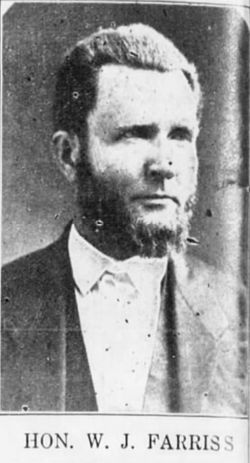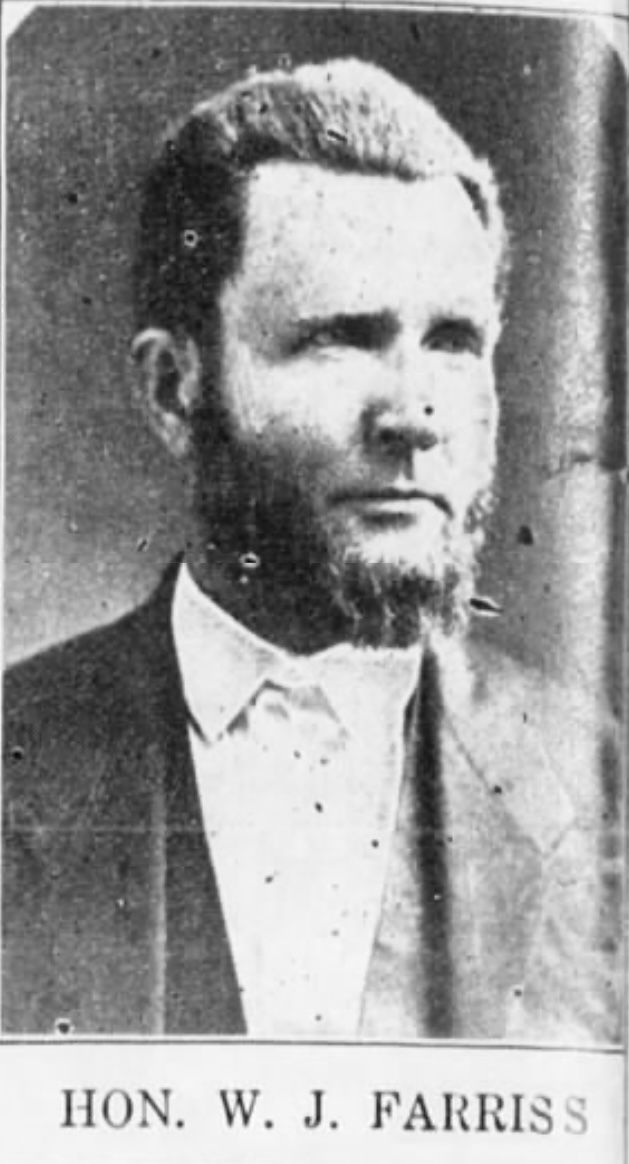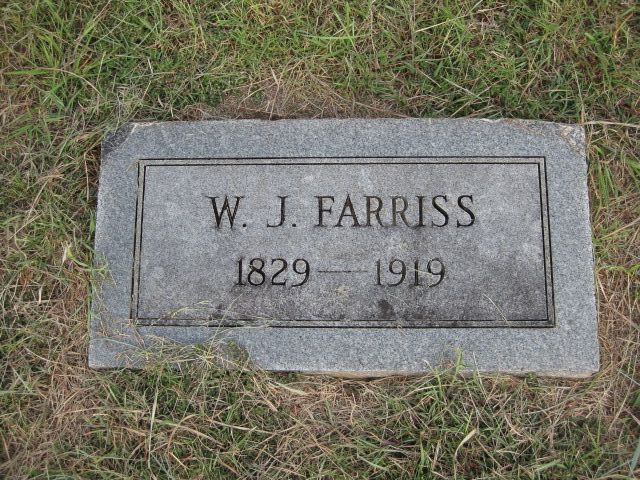From the book "The Sparta Bar" by Frank Trigg Fancher:
"Major Farris was reared in the 5th district of White County. He was related to the Sims family. He commenced the legal profession before the Civil War and entered the Confederate Army. For many years he practiced law at Sparta and was considered a good chancery lawyer. He was well educated.
In physical appearance he was tall and well built, red hair and beard. He always wore a full beard according to the style of the Civil War days. In keeping with his red head he had a violent temper and gave vent to it at unexpected times. Toward some of the other attorneys he bore ill will, but with this writer (Frank Trigg Fancher), C. P. Hutcheson, George H. Hudson and Elzie Kirby, and probably others, he was always most friendly. If he were treated courteously, he was genteel. Many did not understand this.
I saw him draw a pistol on Willbanks, who made good his escape by flight. Once before, however, Willbanks bearded Farris on the Public Square while the latter was unarmed and he took a retreat.
Back in the early 80's (1880s) Farris was shot by T. J. R. (Tom) Swafford. Farris was walking along the street and Swafford stepped out from some good boxes with pistol drawn. Quill Rhea shouted, "Look out, Farris." He turned and dodged or else he would probably have been killed.
Major Farris kept a book which he called his jackass book. (The reader may judge whether the first syllable of the word is given correctly.) Rhea had previously been entered in the book. After the episode the Major wrote under the name, "Quill Rhea not a jackass, saved my life."
Shortly after the Civil War Farris shot and killed a man named Kithcart on the walk east of the Public Square. According to Farris, Kithcart had been threatening and said he would kill a red-headed man before night.
A young man had studied law under Major Farris; I forget whether it was George H. Hudson or Stanton Simrell. He had received his license. Farris inquired if he had a pistol; the young attorney replied that he had none. Farris stormed: "Man, do you tell me you expect to practice law without a pistol?"
When Simrell had finished his study he became a partner with Major Farris. Some friend of Farris asked him if Simrell would fight. "Yes," said Farris, "he will fight, but d*** him, he lacks the deadly intent."
I was with Major Farris in some lawsuits, and also against him in some. I found him to be assiduous for his client, and left no stone turned. I went to Indian Territory after he had moved out there and took his deposition. He was a very important witness in setting up an estoppel in favor of my client. I was at a boarding house but Major Farris came and compelled me to remove and stay with him. Wilbanks was on the other side of the case, but notwithstanding former animosity, Farris treated him with friendliness and invited him in his home. He had abandoned all former grudges and spoke respectfully of everyone.
He embraced Christianity and joined the Holiness Church. He died of flu in the great epidemic in 1918 at the age of ninety.
***Source: The Sparta Bar, by Frank Trigg Fancher, Printed by The Cabinet Press, Milford, N. H., 1950, pp. 34-35. Transcribed by Elma Greenwood, Cookeville, Tennessee, October 10, 2004.
From the book "The Sparta Bar" by Frank Trigg Fancher:
"Major Farris was reared in the 5th district of White County. He was related to the Sims family. He commenced the legal profession before the Civil War and entered the Confederate Army. For many years he practiced law at Sparta and was considered a good chancery lawyer. He was well educated.
In physical appearance he was tall and well built, red hair and beard. He always wore a full beard according to the style of the Civil War days. In keeping with his red head he had a violent temper and gave vent to it at unexpected times. Toward some of the other attorneys he bore ill will, but with this writer (Frank Trigg Fancher), C. P. Hutcheson, George H. Hudson and Elzie Kirby, and probably others, he was always most friendly. If he were treated courteously, he was genteel. Many did not understand this.
I saw him draw a pistol on Willbanks, who made good his escape by flight. Once before, however, Willbanks bearded Farris on the Public Square while the latter was unarmed and he took a retreat.
Back in the early 80's (1880s) Farris was shot by T. J. R. (Tom) Swafford. Farris was walking along the street and Swafford stepped out from some good boxes with pistol drawn. Quill Rhea shouted, "Look out, Farris." He turned and dodged or else he would probably have been killed.
Major Farris kept a book which he called his jackass book. (The reader may judge whether the first syllable of the word is given correctly.) Rhea had previously been entered in the book. After the episode the Major wrote under the name, "Quill Rhea not a jackass, saved my life."
Shortly after the Civil War Farris shot and killed a man named Kithcart on the walk east of the Public Square. According to Farris, Kithcart had been threatening and said he would kill a red-headed man before night.
A young man had studied law under Major Farris; I forget whether it was George H. Hudson or Stanton Simrell. He had received his license. Farris inquired if he had a pistol; the young attorney replied that he had none. Farris stormed: "Man, do you tell me you expect to practice law without a pistol?"
When Simrell had finished his study he became a partner with Major Farris. Some friend of Farris asked him if Simrell would fight. "Yes," said Farris, "he will fight, but d*** him, he lacks the deadly intent."
I was with Major Farris in some lawsuits, and also against him in some. I found him to be assiduous for his client, and left no stone turned. I went to Indian Territory after he had moved out there and took his deposition. He was a very important witness in setting up an estoppel in favor of my client. I was at a boarding house but Major Farris came and compelled me to remove and stay with him. Wilbanks was on the other side of the case, but notwithstanding former animosity, Farris treated him with friendliness and invited him in his home. He had abandoned all former grudges and spoke respectfully of everyone.
He embraced Christianity and joined the Holiness Church. He died of flu in the great epidemic in 1918 at the age of ninety.
***Source: The Sparta Bar, by Frank Trigg Fancher, Printed by The Cabinet Press, Milford, N. H., 1950, pp. 34-35. Transcribed by Elma Greenwood, Cookeville, Tennessee, October 10, 2004.
Family Members
-
![]()
Benjamin Franklin "Frank" Farris
1873–1923
-
![]()
Dovie Lou Farriss Hyden
1873–1945
-
![]()
Simmie F Farriss Grider
1875–1960
-
![]()
Mattie Hester Farriss Slatten
1879–1960
-
![]()
Thomas Leonidas Farriss
1880–1931
-
![]()
Mollie E. Farriss
1881–1962
-
![]()
Helen Farris Rabon
1884–1940
-
![]()
Kate L. Farriss Burris
1886–1961
-
![]()
Evalena Farriss
1888–1933
Sponsored by Ancestry
Advertisement
Explore more
Sponsored by Ancestry
Advertisement














